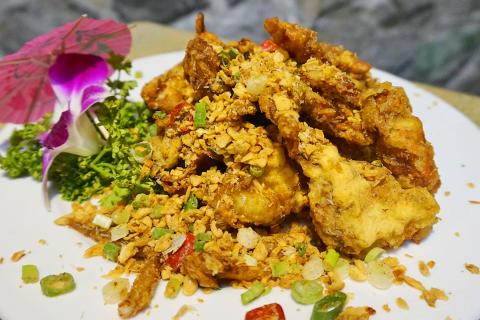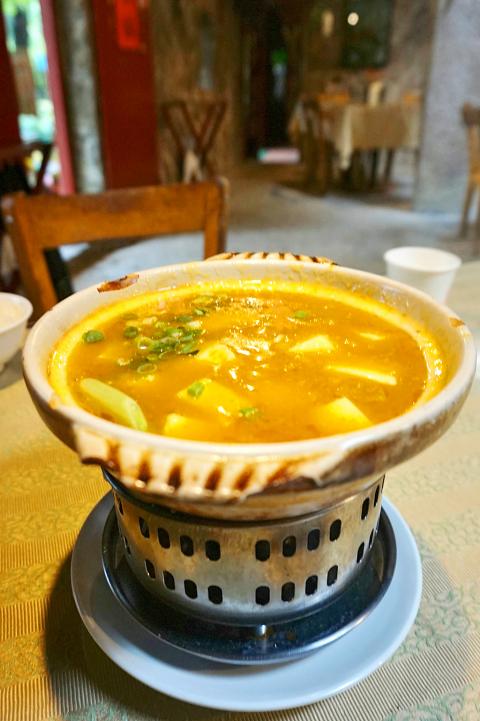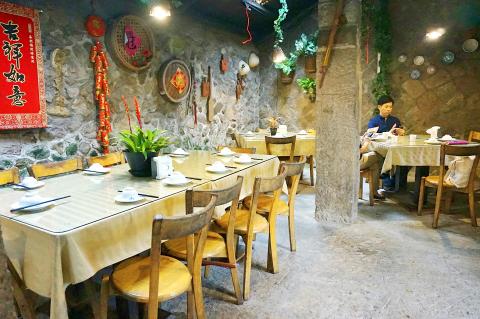The rain is beating relentlessly on our umbrellas when we spot, through the thick shrubbery, a gray stone house covered in vines. Outside, the temperature has dipped a few degrees — a sign that fall had finally arrived, at least in the mountains. A whiff of warm stew beckons our olfactory senses. We had spent the morning visiting a couple of scenic areas around Yangmingshan (陽明山), and this restaurant, nestled high up in the cloud-covered forest along Zhuzihu Road (竹子湖路), was just the type of relaxing late afternoon lunch we were seeking.
Stone House (常青廬) serves home-cooked Taiwanese food in — you guessed it — an old stone house overlooking the Taipei basin. The restaurant is split into two separate buildings — the main house with a cashier, kitchen and seating area on the lower level, and a smaller, cozier converted guest house across the road.
We chose the latter for its ambiance. The floor and walls are made entirely out of gray stone, while gourds, cookie cutters and traditional wooden cooking utensils hang from the walls, creating a rustic, homely vibe. Skylights provide the inside with some natural lighting, while the outside is a lush seating area surrounded by potted plants and trees, perfect for a fine day unlike the afternoon we visited.

Photo: Dana Ter, Taipei Times
As with most Taiwanese food, the dishes at Stone House are primarily sauce-based with a heavy dose of herbs and garnishing. The food at many local restaurants are too oily or greasy for my liking, but Stone House cuts it just right, serving dishes with enough flavor and zest, without being too rich or overwhelming.
To start with, the Szechuan-style kung pao chicken (宮保雞丁, NT$260) is a safe but tasty bet. The chicken, which is chopped into small cubes, is sweet and spicy, deriving most of its flavor from the dried chili and corn flour-based sauce mixed with soya sauce and peppercorn. The chicken itself is tender but a little dry, although the nuts add a crunchy contrast, while the chopped zucchini helps to counter-balance the spiciness.
If you love seafood, try the clams with basil (NT$280). With the Tamsui River (淡水河) at the foot of the mountain, the clams are large, freshly-caught and delectably chewy. They are soaked in a thick-broiled clam sauce which boasts a natural, tangy sweetness, complimented with the basil and spring onion.

Photo: Dana Ter, Taipei Times
Also for devoted seafood lovers is the fried soft shell crab (NT$330) — but be warned that this is not a dish for people who dislike savory flavors. One of the more difficult dishes to cook because the shell remains soft only for a few hours after molting, making timing the most important aspect of the dish’s preparation, the chef did a skillful job, achieving a texture that is neither too crumbly nor too greasy. The skin is tantalizingly crispy and salty, while the inside is warm, soft and crumbles in your mouth. The crab is sprinkled with deep-fried garlic flakes, spring onions and cut chili, all of which help to draw out the natural crispiness of the skin.
My favorite, however, is the stewed tofu pot (NT$260). Served in an earthenware pot atop of a portable stove, soft egg tofu is dipped in a rich, egg yolk-based sauce and topped with spring onions. The concoction is a warm and hearty one, with the sauce sizzling the entire duration of our meal. The tofu is slightly charred and very silky, while the sauce is a little sweet and very thick and runny. In other words, ideal for a cool, rainy day in the mountains.
The only caveat? Having to run back and forth between the guest house and the main house to place our order and pay the bill — although that could be interpreted as part of the authentic rural dining experience. Moreover, the waiters were attentive and obliging even when tasked with transporting our food in the heavy rain. Certainly a gem in this neck of the woods.

Photos: Dana Ter, Taipei Times

June 9 to June 15 A photo of two men riding trendy high-wheel Penny-Farthing bicycles past a Qing Dynasty gate aptly captures the essence of Taipei in 1897 — a newly colonized city on the cusp of great change. The Japanese began making significant modifications to the cityscape in 1899, tearing down Qing-era structures, widening boulevards and installing Western-style infrastructure and buildings. The photographer, Minosuke Imamura, only spent a year in Taiwan as a cartographer for the governor-general’s office, but he left behind a treasure trove of 130 images showing life at the onset of Japanese rule, spanning July 1897 to

One of the most important gripes that Taiwanese have about the Democratic Progressive Party (DPP) is that it has failed to deliver concretely on higher wages, housing prices and other bread-and-butter issues. The parallel complaint is that the DPP cares only about glamor issues, such as removing markers of Chinese Nationalist Party (KMT) colonialism by renaming them, or what the KMT codes as “de-Sinification.” Once again, as a critical election looms, the DPP is presenting evidence for that charge. The KMT was quick to jump on the recent proposal of the Ministry of the Interior (MOI) to rename roads that symbolize

On the evening of June 1, Control Yuan Secretary-General Lee Chun-yi (李俊俋) apologized and resigned in disgrace. His crime was instructing his driver to use a Control Yuan vehicle to transport his dog to a pet grooming salon. The Control Yuan is the government branch that investigates, audits and impeaches government officials for, among other things, misuse of government funds, so his misuse of a government vehicle was highly inappropriate. If this story were told to anyone living in the golden era of swaggering gangsters, flashy nouveau riche businessmen, and corrupt “black gold” politics of the 1980s and 1990s, they would have laughed.

It was just before 6am on a sunny November morning and I could hardly contain my excitement as I arrived at the wharf where I would catch the boat to one of Penghu’s most difficult-to-access islands, a trip that had been on my list for nearly a decade. Little did I know, my dream would soon be crushed. Unsure about which boat was heading to Huayu (花嶼), I found someone who appeared to be a local and asked if this was the right place to wait. “Oh, the boat to Huayu’s been canceled today,” she told me. I couldn’t believe my ears. Surely,